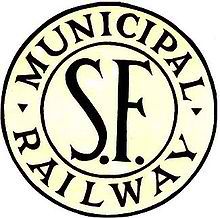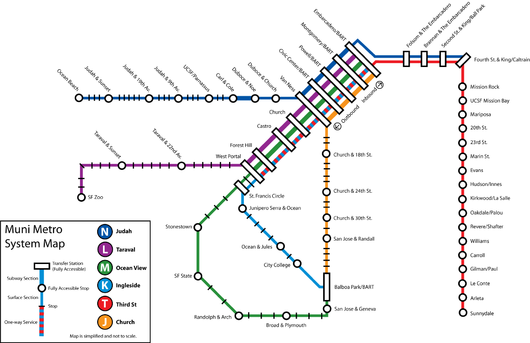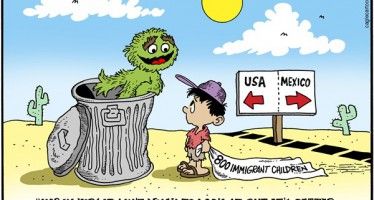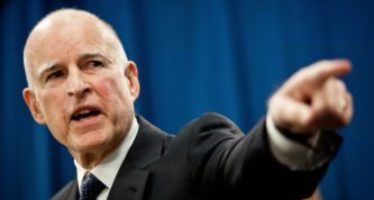S.F. Subway Derails Into Boondoggle
JULY 22, 2011
By KATY GRIMES
The California High-Speed Rail Authority isn’t the state’s only massive choo-choo boondoggle. San Francisco boasts the Central Subway project, a wasteful train system all its own.
Fortunately, citizen volunteers, transportation and rail experts and local writers have been making noise about the Central Subway project. But no one in public office appears to be listening, or care.
Has the train already left the station with all of the elected San Francisco officials on board?
Since the passage of Proposition E in November 1999, the Muni bus system has been part of the San Francisco Municipal Transportation Agency (SFMTA), a semi-independent city agency created by that ballot measure. The Muni, the Department of Parking and Traffic and the Taxicab Commission were merged into the SFMTA, which is governed by a seven-member Board of Directors appointed by the mayor.
When Gavin Newsom was mayor of San Francisco, he and the county supervisors decided that, instead of just beefing up the Muni bus system — which used to be lauded for efficiency — adding expensive trains to the local transportation system was the new direction.
In 2003, Rep. Nancy Pelosi, D-San Francisco, got a special provision for her city inserted into the federal $820 billion budget appropriations bill, bringing home more $100 million in federal earmark money to create the Central Subway project. But that was just the beginning.
Many feel that the transportation projects in San Francisco are only federal money-chasing boondoggles; it would seem that Pelosi’s earmark supports that theory. More than half of the money spent on transportation projects is funded by the federal government — as long as local municipalities “match” the funding, forcing cities into putting local tax measures on the ballot.
In a recent report, the San Francisco Grand Jury blasted the subway project for unaccountable spending of public money — nearly $1.6 billion. Still, no one in elected office in or from San Francisco appears to have lifted a finger to stop the ridiculous train project, nor have indictments come down or heads rolled.
The Central Subway project has grown exponentially, turning into a billion-dollar boondoggle with no end in sight. Neighborhoods and streets have been torn up and a great deal of the existing bus system has been ruined, charge local transit experts and activists. Both train experts and the Grand Jury said that, when completed, the Central Subway will actually leave passengers stranded without connections.
The 1.7-mile line is designed to run from around Pacific Bell Park, under Third and Stockton streets, to Chinatown. But it will no longer connect to BART, the city bus system or the ferry.
The Subway Project
The Central Subway project is phase two of a three-part transportation project, approved by voters in San Francisco as Measure K, which extended to 2033 a sales tax slated for expiration in 2009. The tax originally was passed in 1989.
The completion date of the subway was supposed to be 2011, but has now has been extended to 2019. And the costs have extended and escalated as well: early estimates of $648 million in November 2003 increased to $994 million in 2006 and up to $1.578 billion in 2011. What will the true cost be upon completion in 2019? At $176,000 per foot of construction, this is the most expensive public transit project considered for federal funding. And it doesn’t appear to be slowing or decreasing.
Even with the statewide economic downturn, San Francisco has had to rein in overall budgets. The Central Subway is no exception. “Due to budget constraints, SFMTA has deferred certain capital projects that include expenditures to maintain its assets in a state of good repair,” the Grand Jury found.
In the last three years, SFMTA has lost nearly $180 million of funding from the state, and nearly $50 million from local funding. But instead of cutting waste, SFMTA cut service by more than 10 percent, even after an infusion of federal stimulus funds. Officials said that no routes were eliminated in the service reduction, but about two dozen routes now start operating later or end earlier.
The San Francisco Muni system is not known any longer for its on-time service or dependability. Experts and many stories about SF Muni claim that it runs the slowest service in North America. But Muni officials blame the unreliable service on the economy and city congestion.
According to the 2011 Grand Jury report, in 2007-08, the Muni averaged 70.5 percent on-time performance. This increased only to 73 percent in 2009 and 2010. But in 2011, the number decreased to 72 percent.
Gerald Cauthen, a founder of SaveMuni.com, a professional engineer and former manager of the Muni’s Transit Improvement Program, helped build the Muni system more than 30 years ago. Cauthen says that Chinatown and North Beach desperately need better Muni service, but the Central Subway is not the way to do it. He called the project a “politically charged boondoggle.”
In spite of overwhelming proof that the subway project is flawed, Cauthen said that MTA officials will not alter the plan. And, just as with California High-Speed Rail reports, ridership has been inflated, according to Cauthen.
The Central Subway project is expected to cost San Francisco Muni more than $15 million each year to operate, but will only attract 5,000 riders a day, according to SaveMuni.com, an organization created to find ways of improving San Francisco’s Muni bus system.
A SaveMuni.com white paper described the Central Subway project as a “colossally expensive piece of short subway of marginal utility.” Beside that, criticism of the Central Subway project comes from the failure to connect the subway with the rest of the Muni bus riders, BART, the ferry and other nearby transportation systems. “By failing to connect effectively with the rest of the Muni system, the Central Subway falls far short of meeting 21st Century transit operating standards,” the report stated.
No Direct Connection To Other Transit
Cauthen said several transportation experts criticized the loss of connectivity to other transit. Passengers disembarking at the Union Square/Market Street station will be faced with an underground trek of more than 1,000 feet to other Muni connections, stairs to climb and elevators to navigate.
“With what San Francisco is spending on the Central Subway, every driver in the region could be provided a chauffer and car,” said one transportation activist who asked to remain anonymous.
Several people interviewed for this story asked not to be named for fear of retribution. But it became clear in talking with transportation experts and the SaveMuni activists that the Central Subway was the result of local political horse-trading. “Without analysis, a former mayor offered the subway to Chinatown politicians in exchange for their support to tear down the Embarcadero Freeway,” reported SaveMuni.com.
But this is not news in San Francisco.
Former San Francisco Mayor Gavin Newsom, now California’s lieutenant governor, had his hands in the pie as well. Transit experts have acknowledged that the mayor completely controled Muni and dictated the funding that goes with it.
Labeled as a political vanity project, in 2008 Newsom created the “Culture Bus,” a ridiculous looking yellow decorated bus for driving tourists around the city. The Culture Bus “fleet” was originally made up of five buses, including the tacky yellow bus.
A caveat from the mayor was that the buses be piloted by SF Muni’s “best drivers,” who were pulled from driving regular bus service routes.
“In the first five months of its existence, the Culture Bus cost Muni 10 times as much as the fare revenues brought in; along with the line’s jarringly low ridership, this did not escape notice,” the San Francisco Weekly reported in April 2010.
MTA Controversy
The Municipal Transit Agency (MTA), which operates the bus system and the parking division, was run for 5-½ years by Nathaniel Ford, until his recent departure July 7. Upon leaving, Ford received a $384,000 payout, which the San Francisco Chronicle reported included a year’s salary, deferred compensation and unused vacation.
Ford, interestingly, left a similar post in Atlanta under suspicious circumstances. He was hired in San Francisco, but has been under investigation by the Grand Jury for most of his stay. Many say that Ford knew his time at the MTA was terminal, causing him to hasten his departure.
And most transportation experts and activists have been critical of Ford’s hiring since his transportation credentials were suspicious.
A 2007 story about then-Mayor Newsom in The City Edition reported, “In January, 2006, the mayor’s office chose Nathaniel Ford, the former head of Atlanta’s transit agency, MARTA, to preside over MTA’s $800 million annual budget. Ford is a former conductor on the New York subway system with no formal post-secondary education — well, other than a bachelor’s degree from one of those night colleges that allows students to substitute work hours for credits. Six months into his new stint here, the San Francisco Business Times reported that Georgia state authorities were still investigating Ford and other former executives because they had logged millions of dollars in incidental expenses when MARTA was teetering on bankruptcy.”
It was reported that Ford and his secretaries spent more than $150,000 in unauthorized charges on company credit cards, including entertainment, booze and food, purchases at a golf pro shop, men’s clothing and even a visit to the dentist. At last report, Ford had reimbursed only $11,000 to the agency.
Even after the stories about Ford’s lavish and unauthorized spending, SFMTA Board Member Tom Nolan said, “I think he’s exactly right for the job”, reported the Business Times. “If something happened back there, I don’t know how much that would impact us at all.”
And current San Francisco Mayor Ed Lee “behind the scenes supported giving Ford an early and graceful exit from his contract,” reported the Chronicle.
It appears that everyone I have spoken with agreed that there is a serious scam being pulled over on San Francisco voters and taxpayers, but so far, no one has the power to stop it.
Coming Monday – The Chinatown Connection
Related Articles
Feds bring immigration confusion to CA
Will they or won’t they? After forming quick — some say stealthy — plans to hand California some 300 undocumented immigrants detained in
Clinton crisis renews Brown buzz
With doubts swirling around the Democrats’ leading candidates for president, speculation has returned that Gov. Jerry Brown could enter the race.
Are Split Rolls Coming Soon?
NOV. 16, 2010 By KATY GRIMES The recent passage of Proposition 25, which allows legislators to pass a budget with






